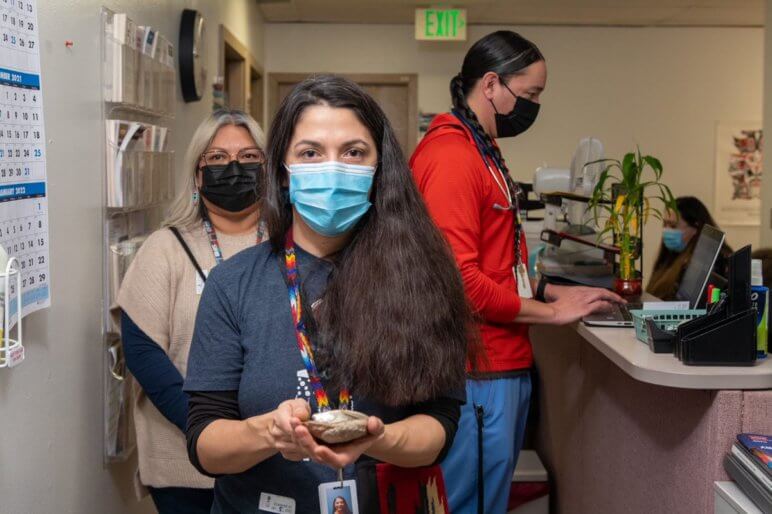Already sizeable and growing, Seattle Indian Health Board’s workforce is filled not only with talent but also an array of lives, journeys, and wisdom. Relative to Relative is a conversation series, lowering barriers to connection through unscripted storytelling. Each installment is an invitation to weave new relationships and recognize the humans behind our healthcare.
Around 8:00 a.m. or 4:00 p.m., you might smell the cedar or sweetgrass or sage that Layla Yamabe (Quinault/Quileute/Squaxin) is holding before you even see her approaching.
As one of Seattle Indian Health Board’s Traditional Indian Medicine Apprentices, Layla helps complete the twice daily smudging of our entire building and those who work inside it. She carries a warmth that extends well beyond the flame continually grazing each day’s medicine, creating pockets of tenderness within the often-hectic realm of healthcare.
“A lot of times we hear, ‘this is the best part of the day, when you come smudge me!” from our coworkers,” Layla said. “Being able to offer this to our relatives, they really appreciate it. I’ve heard before, ‘this is the only place that we can have this!’ You don’t see [Traditional Indian Medicine] at a non-tribal hospital, and it means a lot to be able to take care of the building and relatives and staff members in that way.”
Among the many scents Layla has known and been regularly engulfed in, one stands out as home: the fresh air around Lake Quinault. While she largely grew up in Duwamish territory, her family had a floating house on the water there, at the edge of the Quinault Reservation.

“When I go there, every time I pull into my ancestral lands, I just feel that connection.”
That ability to connect is something Layla facilitates as part of her work at SIHB. While serving Seattle’s urban Native population, she’s met many relatives who’ve spent years disconnected from their Indigeneity, for a variety of reasons.
For some, coming to our clinic is one of their first opportunities to reconnect.
“Every day, pretty much every week, relatives will come to us and thank us for offering this service,” she said. “Sometimes, they were raised either off the reservation or raised by foster families, so they had no access to powwows, coastal jams, canoe journeys, you know, a lot of the cultural gatherings that we attend here…and being that connection to our culture is really important.”
While much of Layla’s time is spent growing, harvesting, preparing and administering plant medicine, her medicine practice is much broader than anything that could fit on a prescription pad.
“Medicine means a lot of things to me,” she said. “I think of humor and laughter as medicine. I think of traditional foods being our medicine. Medicine can also be singing and drumming and dancing…There are many forms of medicine.”
In fact, Layla’s mere presence and the energy she brings to a room have been described as medicine by several her coworkers, both within Traditional Indian Medicine and across the organization. Even on her busiest days, she finds the time to ask how staff are really doing, to see our smiles and sorrows alike, and somehow remember our answers when she sees us next.
Existing as she does, Layla models the kind of care she hopes we’ll give to each other and ourselves.
“One of the big things that’s stuck with me since I started working here is how important it is for people to take care of themselves, including myself,” she reflected. “So, I try hard to take care of myself. I try to meditate as often as I can and pray, in Lushootseed now, too. And other things, like going out into nature or going to the water.”
Most humans, she contends, need more care than they get. This holds especially true for full-time caregivers, a role many SIHB employees fulfill.
“As we do this work, we learn ways to protect our own spirits,” Layla said. “We take care of each other in our department. We know when one of us needs a lift and we might offer to take on some duties for the other. We’re really good about doing that, but we also take care of ourselves and cleanse ourselves.”
Amid the busyness of day-to-day services, some of Layla’s colleagues might only get to know her through our morning and evening smudging. So, take it from Layla’s fellow Traditional Indian Medicine apprentice, Bonnie Keevama (Hopi): “she has a lot more to her than medicine.”
